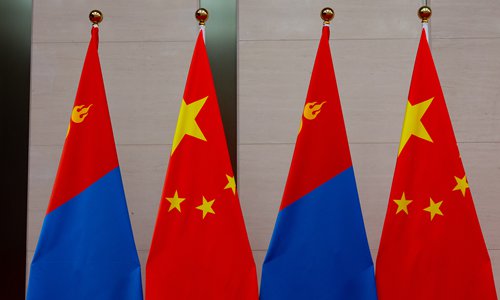HOME >> OPINION
China, Mongolia share development goals after 70 years of diplomatic relations
By Li Chao Source:Global Times Published: 2019/10/15 20:38:40

Photo: VCG
Wednesday marks the 70th anniversary of the establishment of diplomatic ties between China and Mongolia.
China has promoted the building of a community of shared future for mankind, which is of great significance for the good neighborly cooperation between the two Asian neighbors.
First, the concept of a community of shared future for mankind, which is aimed at forging partnerships in which countries treat each other as equals, engage in mutual consultation and show mutual understanding, can help increase political trust between China and Mongolia. The concept underscores that large countries should respect each other's core interests and major concerns and treat small countries as equals.
In keeping with the Treaty on Friendship and Cooperation between China and Mongolia, both sides have agreed to develop good neighborly relations on the basis of mutual respect for independence, sovereignty and territorial integrity, mutual non-aggression, non-interference in each other's internal affairs, equality and cooperation for mutual benefit, and peaceful coexistence. The basic principles of China-Mongolia relations are in line with the concept of a community of shared future for mankind.
Second, the concept of a community of shared future for mankind can bring the two countries closer in terms of security. The concept is committed to promoting common, comprehensive, cooperative and sustainable security in the world and safeguarding the international order centered on the UN Charter.
This is in line with Mongolia's security interests and peaceful foreign policy. The country proposed the Ulaanbaatar Dialogue Initiative to provide a mechanism for Northeast Asian countries to promote peaceful dialogue, avoid armed conflicts, enhance mutual trust among Northeast Asian countries and resolve security problems.
Besides, China and Mongolia will cooperate on combating transnational crimes such as smuggling, drug trafficking and terrorism.
Third, a community of shared future for mankind helps expand China-Mongolia trade. China is the largest energy consumer in the world and has a huge market, while Mongolia is rich in natural resources, and its domestic market is relatively small. China has huge capital and technology for infrastructure development that Mongolia lacks. As a result, China-Mongolia trade volume and cooperation projects have seen a rise.
Major projects implemented by China in Mongolia are in accord with the latter's national development strategy and are beneficial to its socioeconomic development. For example, China has built Mongolia's first highway. China has also been passing on experience and technology to Mongolia during projects and helping Mongolia train professionals and skilled workers, which improves Mongolia's ability to develop independently.
Fourth, it can foster people-to-people contacts between the two countries. China's vision of building a community with a shared future for mankind recognizes and respects the diversity and equality of world civilizations, sees mutual learning among civilizations as an impetus for social development, and promotes inclusiveness and cooperation. It not only grasps the essential feature of social progress, but also shows the power and value of civilizations. It will directly advance people-to-people contacts and cultural communication in the international community. Exchanges between China and Mongolia are of course no exception.
In recent years, there have been frequent cultural exchanges between China and Mongolia. Several cultural events have been organized by the two sides. A growing number of Mongolian students are studying in China, and many Confucius Institutes and Chinese language teaching centers have been set up in Mongolia.
Fifth, it will boost China-Mongolia ecological cooperation. The community with a shared future for mankind not only is an inter-country model of development and communication, but also represents Chinese people's basic judgment of the relationship between human destiny and ecological civilization.
Linked by mountains and rivers, China and its neighbors face similar environmental problems. So China must join hands with its neighbors to build a global ecosystem and seek a path to sustainable development. This also brings a significant opportunity for Mongolia to promote sustainable development. Roughly three-quarters of Mongolia's land is degraded or suffers from desertification. Guided by the concept of a community with a shared future for mankind, the two neighbors can jointly build a green silk road, develop green economy, address climate change, and fight against natural disasters. Specific cooperation projects can be carried out in terms of desertification control, environmental restoration in mining areas, and managing haze.
To summarize, China's proposal to build a community with a shared future for mankind will guarantee comprehensive cooperation between China and Mongolia. In the future, the two countries should broaden consensus, continue to establish and strengthen partnerships in terms of development initiatives, and further push good neighborly relations to new heights.
The author is an assistant research fellow at the Inner Mongolia Academy of Social Sciences. opinion@globaltimes.com.cn
Posted in: ASIAN REVIEW